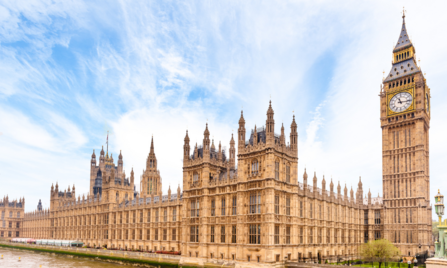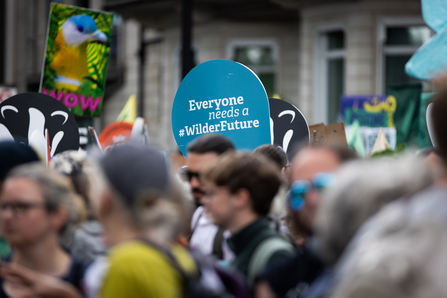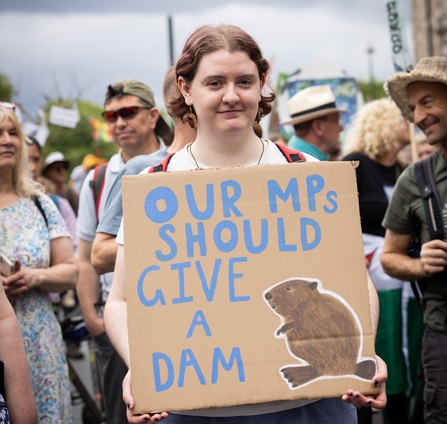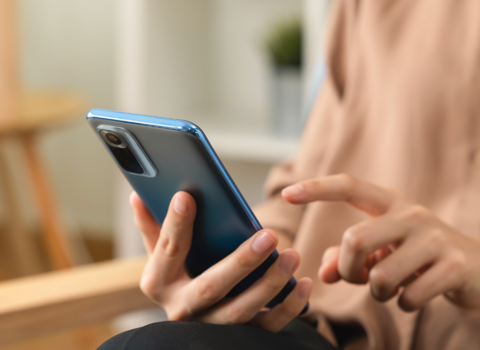Contacting your MP about a local nature issue you care about is important. Follow this guide to contact your MP and speak up for nature.
What is an MP?
An MP is a Member of Parliament who is elected to act on behalf of people who live in a particular area, known as a constituency. They represent the interests and concerns of those people, known as constituents, in the House of Commons. Also, they consider and propose new laws, ask parliamentary questions to relevant departments and ministers, attend functions and events, and hold a 'surgery' for constituents to attend to raise any matters about the constituency.
As a result, MPs split their time between working in their constituency, for their political party, and attending Parliament itself.
There are currently 650 MPs in the United Kingdom.

Who do I contact?
To find out who your local MP is and see their contact details, you can use this tool to enter your postcode and see who represents you:
This will give you information about their name, which political party they represent, what their constituency (local area) is called, how they should be addressed, contact details for their parliamentary office, contact details for their constituency office, their website, and social media.

How can I contact?
You can contact your MP in lots of different ways depending on your preference and the options provided by the MP:
- Write a letter
- Send a free postcard from The Wildlife Trust
- Phone their office
- Send an email
- Tag/message them on social media
- Attend a session for MPs to meet constituents, known as surgeries
How to make your communication effective?

Eleanor Church
Share your story
MPs love personal stories. Share yours with them, choosing experiences that have taken place in your local area and meant a lot to you. Talk about how important wildlife and the natural world is to you and your community. This shows your MP how much nature in your area matters.
Get creative
Use images to show the subject you are talking about. Consider using your five senses (sight, smell, taste, touch, and hearing) to describe your experiences. Do you enjoy a particular craft or hobby? Think about how you could incorporate creativity into your communication with your MP to make it stand out.
Add facts and figures
Include evidence and information in your communication. You can reference your source of information so that the MP can look at it as well. For data about water quality, habitats, land use, and more specifically in your local area, head to our Your Local Area page.
Have a clear ask
Make sure you have some clear things to ask your MP to do for you. This could be for them to write to the relevant department or official, raise the issue publicly in the House of Commons, speak at a local event, or pledge to support your campaign. You could even ask them what they think they can do to help.
Add your address
Don't forget to put your full postal address on anything you communicate to your MP so they know you live in their constituency. There is parliamentary protocol that an MP only works on issues raised by their constituents.
What if they don't listen or respond?

Eleanor Church
MPs are very busy people, so don’t be offended if they don’t get back to you straight away. Each constituency has between 69,700 and 77,000 people which is a lot for one MP to represent all their interests and concerns.
We know how frustrating and disheartening it is when your MP doesn’t seem to listen, repeatedly sends stock responses, or simply doesn’t respond to you at all. While it can feel futile, it is vital that constituents continue to make their concerns known to MPs about issues they care strongly about. MPs are publicly elected, and are obligated to listen to you, and respond to your concerns.
If everyone stops contacting their MP because they don’t think they’ll listen, the MP won’t hear the valid concerns of their constituents. They will likely start to feel the issue is no longer facing opposition. It is important to keep up the pressure to make sure an MP knows when they don’t have constituent backing. The more MPs that find themselves in this position, the more likely they are to question the government’s position.
We do see examples where MPs who were strongly opposed to certain developments or issues have done complete u-turns due to consistent engagement from their constituents, sometimes over several years.
At the same time, showing the people around you, in person or on social media, that you oppose an issue and are contacting your MP has a huge impact. Seeing that you’ve contacted your MP often encourages those around you to do the same, feeling encouraged and reassured that they’re not alone.

Ready to meet your MP?
Meeting your MP face-to-face is a great way to talk about your local nature issue and to build a strong relationship with them. It may be easier to meet somewhere in their constituency and can do this by:
- Attend a session for MPs to meet constituents, known as surgeries
- Booking an appointment with your MP’s office
- Inviting them to attend a local event

How to prepare to meet your MP
There are a few things you can do before, during and after to prepare to meet your MP. This will ensure that you are ready, well-informed, and feel confident to raise your issue. Follow these tips to make sure you get your point across and get a positive outcome for nature.
Remember that MPs are very busy people, and this may be the first time they are hearing about a particular topic so be kind and considerate.
Before the meeting
Research
Find out what your MP’s priorities are, their parliamentary career, voting history on nature and wildlife, current and past roles/committees. Also, do your research on the issue you are raising with them. Collect stories and experiences (qualitative data) as well as facts and figures (quantitative data) to effectively communicate your points. You can find data about constituency on our Your Local Area page.
Create an agenda
Prepare an agenda for the meeting to make sure it remains relevant and on time. You may find it useful to structure the meeting as:
- Introductions – who are you and why are you meeting?
- Summary of the issue
- Further details and information
- Clear asks for the MP
- Time for questions and discussion
- Reiterate the main points to conclude – you can even give a written copy to your MP for them to take away to consider.
Confirm the meeting details
Make sure you double check the location, date, and time of the meeting and confirm with the MP’s office. Also, was there something your MP needed to prepare or research before the meeting? It may be worth sending a follow up email a couple of days beforehand to remind them of the meeting.
During the meeting
Share your story
MPs love personal stories. Share yours with them, choosing experiences that have taken place in your local area and meant a lot to you. Talk about how important wildlife and the natural world is to you and your community. This shows your MP how much nature in your area matters.
Thank your MP
Remember to thank your MP for meeting with you. Their calendars are very busy and so it is important to appreciate them for taking the time to hear your concerns for nature.
Be clear and concise
Meetings with MPs can be quite short so make sure you are staying on topic and getting the essential information across.
Prepare for different views and opinions
Despite delivering a well-informed and persuasive case for your issue, your MP may raise different views and opinions that oppose this. Prepare points about how your issue relates to them and how getting on board will benefit their election priorities and interests.
If you don’t know the answer straight away to an opposing view, offer to follow up after the meeting with further information.
Take a photo
You can ask your MP to take a photo during the meeting to show your community that you’ve met and share what you’ve discussed.
After the meeting
Congratulations
Well done for organising and meeting with your MP. You have acted for nature and become part of #TeamWilder. Add your action to the #TeamWilder Map to share with others what you’ve achieved.
You can also email our Campaigns Officer catherine.craig@wkwt.org.uk to let them know you’ve been in contact with your local MP and the outcome.
Follow Up
Send a follow up email to your MP to thank them for their time and to reiterate the key facts and asks. Also, add any further information they’ve requested from you. Make sure what has been agreed comes to fruition
Share
Share your story of meeting your MP by posting on social media or telling people in your community group.
Taking action will always have more of an impact than not taking action at all.
Warwickshire Wildlife Trust meet your local MPs
We have been meeting your local MPs as part of a series of nature summits. This has involved an introduction to the Trust, our key projects, data about their constituency, and a walk around a local green space. So far, we have meet with Manuela Perteghella, MP for Stratford Upon Avon (Liberal Democrat), Jodie Gosling, MP for Nuneaton (Labour), and Saqib Bhatti, MP for Meriden and Solihull East (Conservative).







